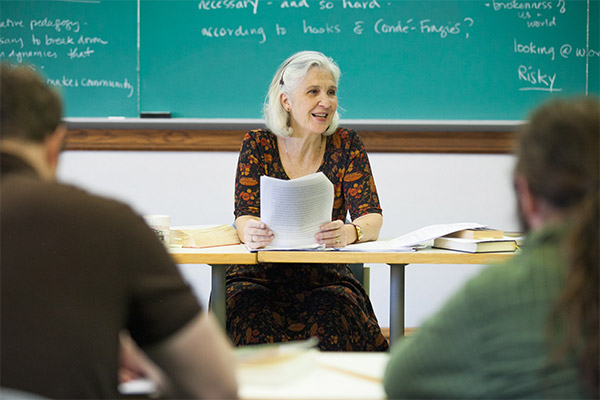The “Inside the PTS Curriculum” series gives you an inside look at what students are learning in their courses at Pittsburgh Theological Seminary. Each article focuses on one class, its subject matter, what students can expect to learn, the required texts, and the kinds of assignments students can expect. We’ll let you know whether the course is required or available for the Master of Divinity (MDiv), the Master of Arts in Pastoral Studies (MAPS), or Master of Theological Studies (MTS). Each article will include the professors’ bio.
This week’s course is: “C. S. Lewis and the Bible.”
About C. S. Lewis and the Bible
During this term, Pittsburgh Theological Seminary students will be learning about C. S. Lewis with Dr. Edith M. Humphrey in the class “C. S. Lewis and the Bible.” This course is open for students in the Master of Divinity (MDiv), Master of Arts in Pastoral Studies (MAPS), and Master of Theology (MTS) degree programs.
In this course, students will engage in a focused study of the work of C. S. Lewis, especially his more neglected books. The course will pay special attention to those biblical and theological themes that are increasingly neglected in the Western Church. The readings from Lewis will be keyed to a parallel study of “uncomfortable” aspects of the biblical witness and traditional theological themes, including the concepts of miracle versus magic, depravity and possession, hell and heaven, propitiatory and representative atonement, and temptation and spiritual blindness.
By the end of the course, students will have fostered the development of their biblical and theological imagination by becoming familiar with subjects not commonly broached in our day. The topics will be studied through poignant examples of Lewis’s theological integration and biblically informed writing. Students will also learn to highlight the differences between Lewis’ day and ours and, with an eye to contextual awareness, consider whether or how such subjects ought to be tackled now in preaching, teaching, and evangelism.
Assignments will include reading, keeping a reflection diary, writing a sermon or short paper with an outline, and participating in classroom discussions. The following works by C. S. Lewis are required reading: Till We Have Faces, That Hideous Strength, The Complete C. S. Lewis Signature Classics (specifically The Great Divorce; Miracles; Abolition of Man; A Grief Observed; and The Problem of Pain), The Collected Works of C. S. Lewis (specifically Pilgrim’s Regress and the essay “Fernseed and Elephants”), The Chronicles of Narnia (specifically The Magician’s Nephew and The Silver Chair), and other essays. These will be read in parallel with Scripture and Deuterocanonical/Apocryphal readings.
About the Instructor
Dr. Edith M. Humphrey is the William F. Orr Professor of New Testament at Pittsburgh Theological Seminary (2002-present). She earned her bachelor’s (with honors) from Victoria University (University of Toronto) and received her doctorate from McGill University, Montreal, where she was awarded the Governor General’s Gold Medal. The author of numerous articles on the literary and rhetorical study of the Bible, she has also written seven books, including most recently Further Up and Further In: Orthodox Conversations with C. S. Lewis on Scripture and Theology (St. Vladimir’s Press, 2017). In her popular writing she has addressed such subjects as the Jesus Seminar, the Trinity, sexuality and the human person, music and theology, the authority of Scripture within the Great Tradition, and Christian spirituality. An active member of the Orthodox Church, she retains strong ties with friends in various denominations and is a popular speaker at church retreats, ecumenical conferences, and seminary events.

